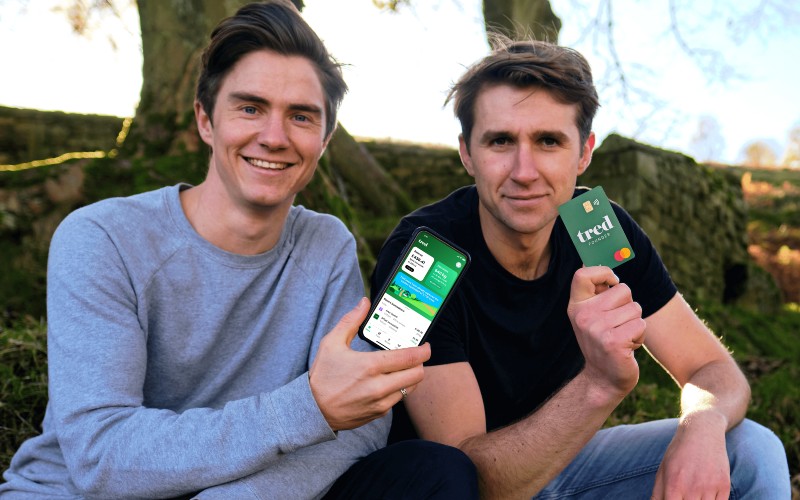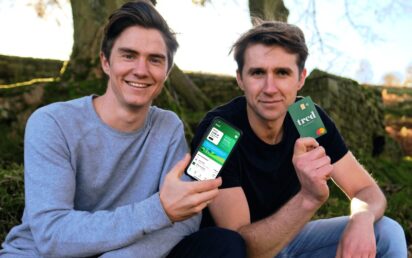Peter Kirby will never forget the moment he went on crowdfunding platform Crowdcube to raise funds for the UK’s first green debit card Tred.
The startup’s technology tracks a user’s carbon footprint with the aim of tackling climate change.
Kirby launched the business with fellow Durham University graduate Will Smith (not THAT Will Smith!) and had already raised £300,000 from angel investors when they opted to raise another £400,000 on Crowdcube.
“The campaign was meant to be for a month but we hit the target within 90 minutes of going live,” he recalls to TechBlast. “It was a bonkers experience. We had 1,032 people saying they backed this.”
In the end the duo raised a total of £1m but anyone who thinks their success was a case of beginner’s luck couldn’t be further from the truth as Tred represented their 67th business idea.
Tred’s story began when the co-founders met in unlikely circumstances in 2011.
“I was in an early morning lecture in mechanical engineering at Durham University,” remembers Kirby with a smile. “It was freshers week and the guy next to me fell asleep and his head knocked my shoulder. It turned out to be Will and we became best mates.”
The duo lived together and resolved to go into business as soon as they came up with the right idea.
The pair got jobs when they left university in 2015 with Kirby becoming a management consultant, which included a spell working in an olive factory.
“Will and I realised that I wasn’t going to come up with the idea but together we would make it work,” he says.
“He used to keep a list of all the ideas and I think he got to 67 before he sat me down and said ‘we’ve got one that’s a goer here’. It was a great idea at the right time and it played to our skillset.”
The idea was for a green debit card and the friends started by looking at the carbon footprint created by the transactions on their own bank statements.
There are three key steps to Tred’s approach.
The first is categorisation and identifies the different type of spends such as flights, groceries and train journeys.
The second is a personal overlay to create a carbon footprint. For example, a vegan non-driver would be expected to generate lower carbon emissions than a meat-eating 4×4 driver.
The third looks at the vendors the individual transacts with as some may be more sustainable than others.
This data then creates a carbon emission reading for each transaction.
“For example, we could say the transaction was the equivalent of 10 kilogrammes of CO2,” he explains. “We can then aggregate that and estimate what the carbon footprint of our user is.
“Over a period of time I would know if 50% of my CO2 emissions related to travel, 10% to groceries etc. That’s the start.”
Kirby says the figures mean nothing without context.
“Most people know what 2,000 calories look like but what does 10kg of CO2 look like?” he asks. “That’s why we contextualise it i.e. it’s the equivalent to this many miles driven or this many trees.”
Kirby says it’s vital the world reduces its carbon emissions rather than just off-sets them.
What’s clear is Tred’s mission to tackle carbon change has resonated with the younger demographic and convinced a lot of people to invest.
“One angel investor sat down with his children, who I think were in their early 20s, and told them about our product,” recalls Kirby. “They said ‘we really love this product, we get that, it’s something we would use’. That was a wake-up call to him and he said ‘I trust my daughters more than I trust myself. I’d like to be involved in this journey’.”
Tred gave away just over 16% of their equity as part of the Crowdcube investment and even gained the backing of one of the co-founders of the investment app Nutmeg.
Kirby admits it took him a while to appreciate the size of climate change.
“Four or five years ago I was completely disengaged with the climate change problem,” he says. “I hadn’t woken up to it. Then I realised the decisions that I was making were contributing to it. I have actively reduced my food waste, changed my diet and the way I get to work.
‘It’s obvious when you say it but we had to go on a journey to do so.”
Tred currently has tens of thousands of people on a waiting list for the product, which is undergoing rigorous testing. It’s hoped it can be launched on iOS and Android in the next few months.
Users will be able to choose a physical debit card, using recycled plastic or a digital payment platform like Apple Pay.
In August 2020 Tred registered with, and is regulated by, the FCA and is backed by Mastercard. Because it’s a debit card rather than a credit card there are no credit checks.
Tred comes down to three key words – ‘track, reduce, offset’ – but Kirby says a debit card is just the beginning.
“We started by wanting to help people make better decisions with their money for the planet,” he explains.
“The debit card monitors daily spending but we want to go further than that. We want to help people with their investments and savings too.
“The debit card tracks, reduces and offsets your carbon footprint. It’s a Fitbit for fighting climate change.
“The second part is a simple model and is us reinvesting some of the money we make from the transactions straight into re-wilding and reforestation projects.”
Kirby clearly has a great relationship with his co-founder, who he describes as a ‘walking disappointment for restaurants’ on account of their reaction when the famous actor Will Smith doesn’t turn up for a booking.
“The plan now is to prove the product really works with customers,” says Kirby. “We’re going to spend the next few months scaling to prove the product engages with customers and reduces their footprint.
“All going well we’ll use the information to go into a second funding round.”
- Peter Kirby is speaking at a virtual event on January 31st entitled ‘Tech trends and the investment story in the Leeds City Region’ https://www.techclimbers.co.uk/webinar/tech-trends-investment-story-leeds-city-region-2022?hsLang=en-gb


